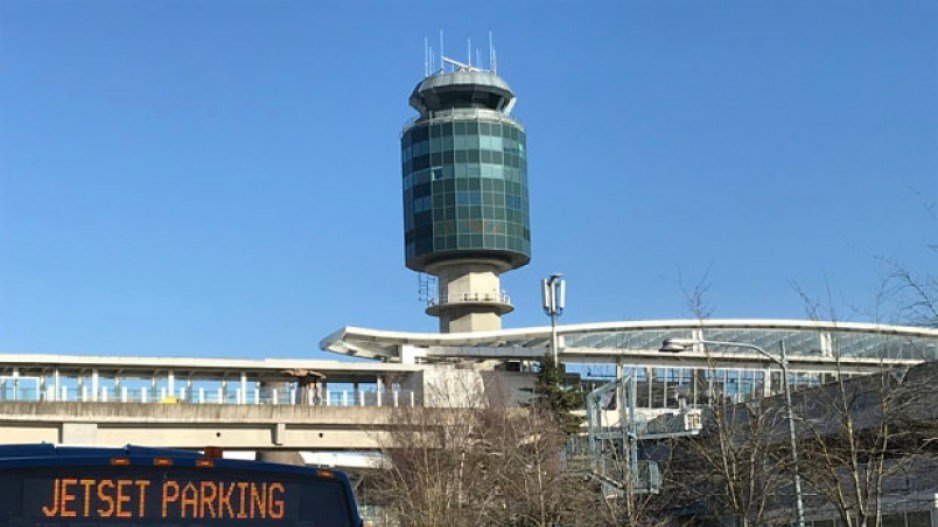The Airport Improvement Fee (AIF) at Vancouver International Airport (YVR) will rise for those flying outside B.C. to $25, from $20, starting January 1. Those flying within B.C. and the Yukon will continue to pay $5.
Craig Richmond, president and CEO of the Vancouver Airport Authority (VAA), announced the fee increase during a speech this afternoon (September 12) at a Greater Vancouver Board of Trade luncheon. He explained that the hike is needed in order to expand the airport as it increases the number of passengers who pass through its gates each year.
This is the first time since 2012 that the VAA has raised the fee, and it brings its airport in line with other major airports in Canada.
Airports in Calgary, Edmonton and Montreal all have $30 AIFs for out-of-province travel. The Halifax Stanfield International Airport charges a $28 AIF for out-of-province travel, while the Toronto Pearson Airport and the Winnipeg James Armstrong Richardson International Airport each have $25 AIFs for out-of-province travel. The only major airport in Canada to have a lower AIF than $25 is the Ottawa International Airport, where the AIF is $23.
Airlines collect the fee and pass the money to the VAA.
Many airline executives have told Business in Vancouver that they want the fees to be as low as possible. Earlier this summer, for example, David Tait, the executive chairman of Flair Air, said that he wanted the federal government to put a cap on the amount of AIF that an airport authority can charge.
AIFs are among the fees that get folded into airfares and combine to help make Canadian airfares substantially more than counterparts in the U.S., he explained. The result of that disparity is that many B.C. travellers drive across the U.S. border to Bellingham in order to fly out of that airport and pay lower fees, Tait said.
AIFs south of the border are about half as they are in Canada.
Richmond told BIV after the event that he is convinced that raising the AIF will not deter passengers from flying. Last year, 25,936,907 passengers passed through YVR, or about 8.5 million more passengers than when the VAA last hiked its AIF.
He said that airlines at YVR "approve" any capital expense that is more than $10 million that the VAA incurs, so they know what the airport is spending the AIF on.
Dozens of airport improvements are in various stages of completion, including what was announced in 2017 as a $5.6 billion terminal expansion plan.
This will, however, be the only increase to the AIF for the foreseeable future, Richmond said.
"We don't see a need for another increase for a while," he told BIV, in a quote that media may refer to in the future.
Richmond was reminded in an earlier question-and-answer session about statements from past VAA executives.
Those people initially described the AIF as "temporary" when it was first introduced in 1993.
"I don't know why that was ever said," he responded. "I wasn't part of the senior management. I was in the role of consultant at the time. [The AIF is] not going to go away because it's such a vital part of how we borrow money."
The AIF provides 31% of the VAA's revenue, or more than $172 million in 2018. Aeronautical revenue, from things such as landing fees, contribute 25% of the VAA's revenue, or about $143 million, while non-aeronautical revenue, from retail leases, parking fees and other levies bring in 44% of the VAA's revenue, or about $250 million.
By the end of this year, the VAA plans to have a new bond issue, Richmond said. And it will have close to $1 billion in debt.
The increase in the AIF, however, will not chip away at the debt. Instead, it will provide a reliable revenue stream that the VAA can show to lenders to enable the VAA to borrow more money.
"Over time the debt will go up," Richmond said. "If we continue to see the growth that we’ve seen, and there is no reason to expect that we won’t, we'll have to build more, and our debt will go up."
All money raised from the AIF is earmarked for capital projects such as runway and terminal-building expansions.
Richmond, in his speech, referred to the concept of providing today what will exist tomorrow with a phraseology borrowed from former Tourism Vancouver CEO Rick Antonson. Antonson described the concept as "cathedral thinking," Richmond said.
The concept holds that workers centuries ago who worked on European cathedrals would never live long enough to see their monuments' completion.
The equivalency is that his work at the helm of YVR is intended to help future executives steward the airport's evolution.




